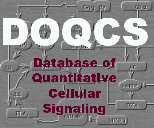
|
Enter a Search String | | Special character and space not allowed in the query term.
Search string should be at least 2 characters long. |
Molecule Parameter List for STAT1c*-STAT1c* | The statistics table lists the distribution of a molecule acting either as a substrate, product, enzyme or as a molecule within the network.
The text color of a molecule is highlighted by  color. color. | | Statistics |
Accession and Pathway Details | |
| Accession Name | Accession No. | Accession Type | Pathway Link | Jak-Stat_
Pathway | 66 | Pathway |
Jak-Stat_Pathway | This model was taken from the Yamada S et al. FEBS Letters 2003 Jan 16;534(1-3):190-6
This model shows the control mechanism of Jak-Stat pathway, here SOCS1 (Suppressor of cytokine signaling-I) was identified as the negative regulator of Jak and STAT signal transduction pathway.
Note: There are a few ambiguities in the paper like initial concentration of IFN and some reactions were missing in the paper that were employed for obtaining the results. The graphs are almost similar to the graphs as shown in the paper but still some ambiguities regarding the concentration are there. Thanks to Dr Satoshi Yamada for clarifying some of those ambiguities and providing the values used in the simulations. |
STAT1c*-STAT1c* acting as a Molecule in Jak-Stat_Pathway Network
| Name | Accession Name | Pathway Name | Initial Conc.
(uM) | Volume
(fL) | Buffered | | STAT1c*-STAT1c* | Jak-Stat_
Pathway
Accession No. : 66 | Jak-Stat_
Pathway
Pathway No. : 293 | 0 | 0.0016667 | No | | Cytoplasmic fraction of phosphorylated STAT1 dimers Appendix, Satoshi Yamada et al 2003 FEBS Letters 534:190-196 |
STAT1c*-STAT1c* acting as a Substrate in a reaction in Jak-Stat_Pathway Network
| Kd is calculated only for second order reactions, like nA+nB <->nC or nA<->nC+nD, where n is number and A,B,C,D are molecules, where as for first order reactions Keq is calculated.
Kd for higher order reaction are not consider. |
| | Name | Accession Name | Pathway Name | Kf | Kb | Kd | tau | Reagents | | 1 | PPX_binding[2] | Jak-Stat_
Pathway
Accession No. : 66 | Jak-Stat_
Pathway
Pathway No. : 293 | 1
(uM^-1 s^-1) | 0.2
(s^-1) | Kd(bf) = 0.2(uM) | - | Substrate
PPX
STAT1c*-STAT1c*
Product
PPX-STAT1c*-STAT
1c*
| | | Binding of PPX to phosphorylated STAT1c dimer Kf = 1*10e+06 /M/sec = 1/uM/sec Kb = 0.2 /sec Appendix, Satoshi Yamada et al 2003 FEBS Letters 534:190-196 | | 2 | STAT1c_nuclear_
trans | Jak-Stat_
Pathway
Accession No. : 66 | Jak-Stat_
Pathway
Pathway No. : 293 | 0.005
(s^-1) | 0
(s^-1) | - | - | Substrate
STAT1c*-STAT1c*
Product
STAT1n*-STAT1n*
| | | Transport of cytoplasmic, phosphorylated STAT1 dimers to the nucleus Kf = 0.005 /sec Kb = 0 /sec Appendix, Satoshi Yamada et al 2003 FEBS Letters 534:190-196 |
STAT1c*-STAT1c* acting as a Product in a reaction in Jak-Stat_Pathway Network
| Kd is calculated only for second order reactions, like nA+nB <->nC or nA<->nC+nD, where n is number and A,B,C,D are molecules, where as for first order reactions Keq is calculated.
Kd for higher order reaction are not consider. |
| Name | Accession Name | Pathway Name | Kf | Kb | Kd | tau | Reagents | STAT1c*_
dimerisation | Jak-Stat_
Pathway
Accession No. : 66 | Jak-Stat_
Pathway
Pathway No. : 293 | 20
(uM^-1 s^-1) | 0.1
(s^-1) | Keq = 0.005(uM) | - | Substrate
STAT1c*
STAT1c*
Product
STAT1c*-STAT1c*
| | Dimerisation of phosphorylated STAT1c Kf = 20*10e+06 /M/sec = 20/uM/sec Kb = 0.1 /sec Appendix, Satoshi Yamada et al 2003 FEBS Letters 534:190-196 |
| Database compilation and code copyright (C) 2022, Upinder S. Bhalla and NCBS/TIFR
This Copyright is applied to ensure that the contents of this database remain freely available. Please see FAQ for details. |
|
